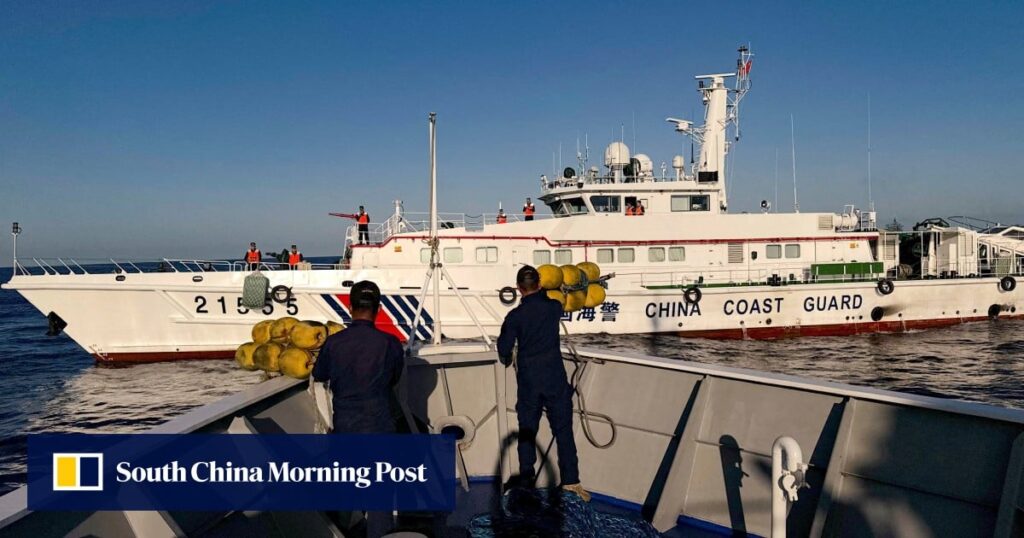Manila and Washington Reinforce Commitment Amid Escalating Tensions in the South China Sea
Manila, February 14, 2023 – In light of the longstanding 1951 Mutual Defence Treaty (MDT), Manila and the United States continue to demonstrate a robust alliance, prepared to support each other in the face of external aggression. This treaty forms the backbone of their partnership in a region fraught with territorial disputes and geopolitical complexities.
On Tuesday, Philippine military chief General Romeo Brawner commented on the recent provocations by the Chinese coastguard, emphasizing that the Chinese have "no right or legal authority to interfere with our legitimate operations or damage our assets within our exclusive economic zone (EEZ)." Brawner accused Beijing of "reckless and aggressive behaviour," which, he said, not only violates international maritime law but also Philippine sovereignty, posing substantial risks to regional stability.
These assertions come as the region grapples with a heightened incident in the Second Thomas Shoal, an area of the South China Sea that has historically been a flashpoint for conflicts between Manila and Beijing. The Chinese authorities have blamed the Philippines for the latest controversy, suggesting that the Philippine vessel dismissed "repeated solemn warnings."
Despite the tensions, General Brawner affirmed the Philippines’ commitment to upholding the rule of law, expressing an intention to work with international partners to ensure peace and stability across the West Philippine Sea and the Indo-Pacific region. He reiterated that while the recent injury to a Filipino sailor was regrettable, it did not meet the threshold to activate the MDT.
The Chinese government’s assertion that the Philippines is at fault reflects a longstanding pattern of territorial assertiveness in the South China Sea. This area is critical for its strategic and economic significance, housing vital maritime routes and potential underwater resources.
Adding perspective, Jose Antonio Custodio, a defence analyst and fellow at the Consortium of Indo-Pacific Researchers, stated that any severe Philippine casualties or significant vessel losses might be the catalyst for heightened U.S. involvement. However, he noted that such a scenario would likely follow considerable diplomatic exchanges between Manila and Beijing.
U.S. Deputy Secretary of State Kurt Campbell reiterated this in a dialogue with his Philippine counterpart, Maria Theresa Lazaro, condemning China’s "dangerous actions" and reaffirming the MDT’s coverage of armed attacks on Philippine armed forces, coastguard, and public vessels in the South China Sea.
In a 2022 visit to Palawan, U.S. Vice-President Kamala Harris emphasized the United States’ vested interest in the South China Sea, reinforcing the "profound stake" America has in the future of this volatile region.
Yet, the prospect of a direct military conflict remains nuanced. Abdul Rahman Yaacob, a researcher at the Lowy Institute, highlighted the potential complications of U.S. military intervention in the presence of existing commitments in Europe and the Middle East. Simultaneously, he contested the actual combat efficacy of China’s vast navy, suggesting it may be a "paper tiger" in confrontation with U.S. forces.
For Beijing to provoke a full treaty-based U.S. response, it would likely need to commit a clear act of military aggression, such as causing significant harm to Filipino servicemen. Short of that, incidents are more likely to remain within the ‘grey zone,’ characterized by aggressive yet non-lethal tactics.
Edmund Tayao, of the Political Economic Elemental Researchers and Strategists, noted the inconsistency in U.S. commitments under the MDT through various administrations. He urged for clearer, prompt responses in support of Manila, particularly as past incidents have often seen varied U.S. actions.
American security analyst Raymond Powell suggested that formal consultations on the MDT between Manila and Washington could act as a significant deterrent to China, signaling a serious commitment to their alliance.
In the volatile environment of the South China Sea, the interplay of regional and international forces continues to underscore the importance of diplomatic engagement and strategic partnerships. As Suharto Ambolodto, a parliamentary member in the Philippines, emphasized, it is crucial for Manila and Beijing to return to negotiations to mitigate the risk of further escalations.
Additional reporting by Associated Press
For ongoing coverage and expert analysis, visit [Your Source Website].
This rewrite aims to provide a comprehensive and nuanced view of the situation, incorporating historical context and expert commentary to offer a well-rounded news article.
